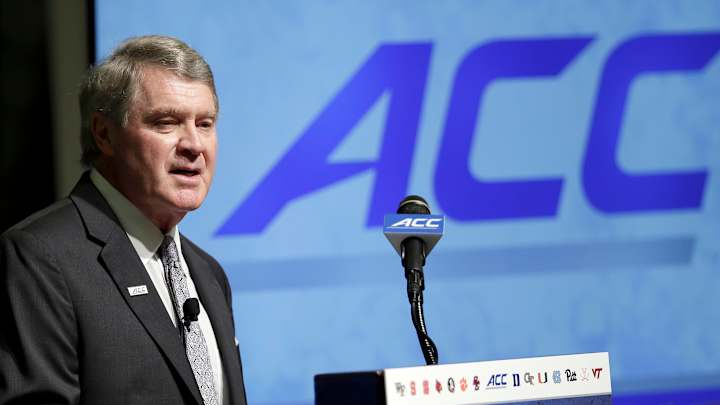ACC faces many variables on TV channel to rival SEC, Big Ten

The Atlantic Coast Conference is still figuring out whether it will start a dedicated cable channel of its own.
Details have been scarce about the behind-the-scenes process the league and broadcast partner ESPN are navigating in an effort to determine whether it makes financial sense to start an ACC-specific channel like the ones some other conferences have.
League Commissioner John Swofford has even joked about the situation, ''I know you're very tired of hearing me talk and not say much on that subject.''
The possibility excites ACC coaches and athletic directors who say they want the league's ultimate decision - whatever it is - to be a prudent one.
Virginia AD Craig Littlepage is ''optimistic for the prospect of an ACC channel,'' though he acknowledges ''a lot of elements and moving parts with the changing landscape on so many different levels.''
North Carolina State's Debbie Yow praised the ACC for being ''diligent in their efforts.''
''Obviously, all ADs and all coaches want this to happen sooner rather than later,'' Yow said, ''but the commissioner will let us know when the time is right.''
Swofford has never set a timetable for a decision even as the idea of an ACC channel has replaced conference realignment in recent years as the league's most challenging off-the-field topic.
North Carolina coach Larry Fedora said establishing a network is ''crucial for the success of the league'' because of the added boost in exposure and revenue it could generate.
''I think every league's going to have it,'' he added. ''The ones that don't right now, they're going to have it eventually. So you might as well get in there and get going.''
But industry analysts say the ACC is wise not to rush into anything in an effort to keep up with the Big Ten and Southeastern conferences, whose networks have been the most successful.
''A lot of the other conferences and individual schools have set up networks and it's successful, but it isn't a slam dunk in as far as being able to get the cable carriage, the production and organization and selling advertising on it,'' said Mark Fratrik, an analyst for Virginia-based market research firm BIA/Kelsey. ''There are hurdles to go through.''
The lucrative Big Ten Network launched before the 2007 season and is backed by Fox. The 1-year-old SEC Network is tied to ESPN, and its success helped push that league's revenue total to a record $455 million split between 14 schools.
The Pac-12 has no such partner, instead owning the network it started in 2012, and has faced some distribution difficulties - for example, leading satellite provider DirecTV does not carry the network.
The ACC's most recent expansions - which moved the conference into western Pennsylvania, New York and Kentucky, and brought on board national brand Notre Dame in all sports but football - have significantly broadened the league's geographic footprint. That helps in building a base of subscribers for a potential network.
The infrastructure for a channel would seem to exist already in Charlotte - where the SEC Network is headquartered along with ESPNU.
There's also the issue of changes in viewing habits, with content available on mobile devices and some consumers dropping their pay TV packages altogether - a phenomenon known as cord-cutting.
Fratrik said that ''is a concern of anybody who is considering a new network,'' though Swofford downplayed the impact cord-cutters might have.
Ultimately, the issue will come down to whether both ESPN and the ACC will make more money with a league-specific channel or without one.
Under terms of the ACC's most recently renegotiated media rights deal with ESPN that runs through 2026-27, the league's 14 football playing members will receive an average of more than $20 million annually.
''While you can sort of generate an Excel spreadsheet and models, `OK, we'll get this subscriber dollar amount each month,''' Fratrik said, ''you would have to weigh that against the dollar amounts you get presently from the various sports contracts to say whether or not the ACC network is more profitable than what's going on now.''
---
AP Sports Writers Aaron Beard in Raleigh, North Carolina, and Hank Kurz Jr. in Richmond, Virginia, contributed to this report.
---
Follow Joedy McCreary on Twitter at http://twitter.com/joedyap
